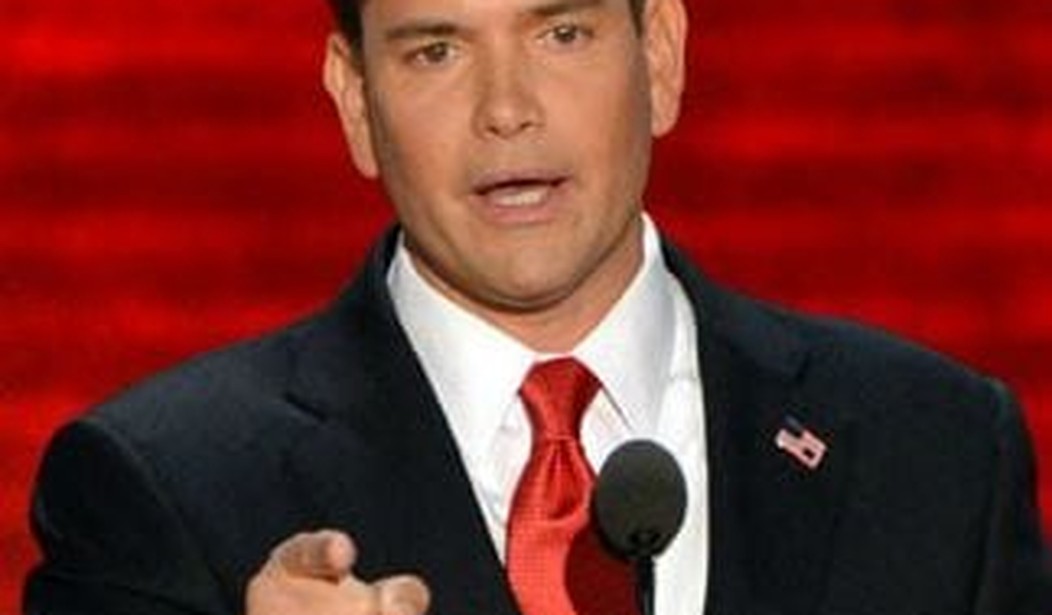WASHINGTON – Sen. Marco Rubio (R-Fla.) outlined Wednesday a package of economic policies based on modern ideas inspired by conservative principles that he said would take the country in a new direction.
In a major speech at an event co-sponsored by the Young Guns Network, a group with ties to House Majority Leader Eric Cantor (R-Va.), Rubio framed his new policy agenda “designed specifically for the 21st century” as an effort to stop “the erosion of the American dream through modern conservative reforms.”
He began by telling the audience about his humble upbringing and the privilege he felt of being “raised in a stable family” with parents who had jobs allowing them to provide for their children.
“I was privileged to be born in a land of equal opportunity, the one place on earth where the son of a bartender and a maid could achieve the same things as a son of a president or a millionaire,” Rubio said at Hillsdale College’s Kirby Center for Constitutional Studies and Citizenship in Washington, D.C.
Rubio described his platform as a “limited government and free enterprise movement that applies the principles of our founding fathers to the challenges and opportunities facing Americans in their daily lives.”
“We’re blessed to live in a country on whose cornerstone is etched the principle that all people have a God-given right to go as far as their talent and effort will take them,” he said. “Because here, so many people have been able to achieve the universal dream of a better life, this dream has come to bear our name: the American dream.”
Rubio said for most Americans this means having a job that pays enough to have a home, feed their family, and save for retirement.
“Too many are starting to believe the American dream is no longer possible for people like them,” he said.
Rubio did not offer anything new in terms of policy prescriptions, touching upon many of his previously announced ideas and legislation he has introduced over the last year.
He said that the last six years have been particularly difficult for three sets of Americans: single mothers, recent college graduates, and working-class families.
Rubio shared the stories of several people who belonged to each category, while outlining policies he believed would improve their circumstances.
He mentioned a pro-family tax proposal he developed along with Sen. Mike Lee (R-Utah) that would increase the child tax credit per family and would make it more easily refundable. He also cited a bill he backed with Sen. Ron Wyden (D-Ore.) that would require universities to tell prospective students how much their graduates earn with a given degree. Lastly, he said repealing the Affordable Care Act and replacing it with “market-centered reforms” would give working families the power “to buy the kind of health insurance they want, from any company they choose, at a price they can afford.”
Rubio said the decline of the American dream does not solely fall on the Great Recession; rather, it is the result of a “rapid and disruptive transformation of our economy driven by automation and globalization.”
“The great cause of our time is to reclaim the American dream for more of our people than ever before. And in doing so leave for our children what our parents left for us: the single greatest nation the world has ever known,” he said.
Rubio attributed much of the blame for these economic woes to the federal government’s failure to adjust to the realities of a new era.
“Instead of attracting jobs to our shores through simplifying taxes and regulations, it imposes higher taxes and more regulations. Instead of anti-poverty programs that promote work and education so our people can emerge from poverty, we pump more money into programs that have failed us for a half century. Instead of taking steps to make higher education more available and more affordable, we pour resources into a system that is expensive and inaccessible and is graduating too many people with unemployable degrees. And instead of modernizing our retirement programs to make them accessible to everyone, we put more money into unsustainable programs that were designed in the 1930s,” he said.
Rubio said many of these policies have left many feeling “completely alienated from our government and its leaders.”
“They feel as if no one here in Washington understands what they are facing and no one here has answers to their challenges,” he said.
Rubio’s speech comes the same week as President Barack Obama’s summit on working families in which he detailed ways to help working parents balance their family lives with their careers and make ends meet.
While lauding the president for hosting the summit, Rubio criticized his economic policy proposals for not going “far enough.”
“Up to this point, his plan to restore the American dream has been an old and familiar one: raise taxes, create more regulations, pour more money into government programs, and accuse anyone who doesn’t agree with him of not caring,” he said.
Rubio said the ideas the president introduced in the summit are more “symbolic than they are substantive.” He also said Republicans “too often will allow themselves to be a party that is not for growth but for big businesses.”
The young Florida Republican is among a group of GOP candidates believed to be vying for the party’s 2016 presidential nomination. Rubio has stepped up in recent months his efforts to increase his national exposure, including trips abroad to meet with foreign leaders and visits to presidential nominating states.
In a June CNN poll, Rubio pulled 8 percent among GOP presidential candidates, coming in sixth place behind the likes of Sen. Rand Paul (R-Ky.), New Jersey Gov. Chris Christie, and Rep. Paul Ryan (R-Wis.).









Join the conversation as a VIP Member